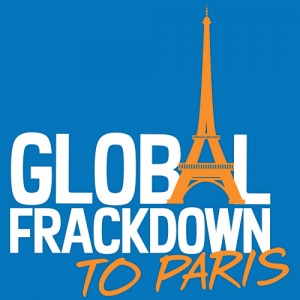 Here I am, busily preparing for the Global Frackdown. We are planning a delivery action of our awesome sign-on letter in Brussels to our elected officials, preparing a global gathering of anti-fracking activists during the climate summit in Paris (stay tuned for more details), and generally keeping up with the latest developments on shale gas in Brussels.
Here I am, busily preparing for the Global Frackdown. We are planning a delivery action of our awesome sign-on letter in Brussels to our elected officials, preparing a global gathering of anti-fracking activists during the climate summit in Paris (stay tuned for more details), and generally keeping up with the latest developments on shale gas in Brussels.
For example, we officially launched our latest report ‘Fracking Business (As Usual)’ last week, which clearly demonstrates how the European Commission’s soft-touch approach of the fracking industry is failing to protect the environment and health of European citizens. For starters, its ‘Recommendation’ on fracking, issued almost two years ago, is non-binding. The Recommendation is also quite vague on a number of crucial issues such as the chemicals used in fracking and the way fracking wastewater will be treated. Our report also details how the European Union institutions rely e.g. mainly on industry operators to establish a baseline on key environmental parameters. Needless to say that appealing to the better nature of Big Oil and Gas and pro-fracking governments of Poland and the UK has not made any difference on the ground.
Hence, it should not come as a surprise that some regional governments are pushing back against the efforts of European and national governments wanting to get shale gas exploration underway, without imposing too many environmental restrictions. With the EU unwilling to do its job on fracking, many regional governments have decided to make sure that shale gas exploration cannot get underway. In late September, the most populous state in Germany – North Rhine-Westphalia – announced that its National Development Plan would include a new objective that excludes the use of fracking to extract unconventional oil and gas. Just days later, another regional government – this time in Northern Ireland in the UK – also announced its intention to include a moratorium on fracking in its planning policy noting that fracking should not be allowed there “until there is sufficient and robust evidence on all environmental impacts”. Some days later, the Spanish region of Castilla-La Mancha also decided to make it impossible to get fracking underway by requiring excessive permitting and environmental procedures, which should make it impossible to get fracking underway on its territory. And in early October, the regional parliament of the Spanish region of Murcia approved a resolution that declares itself frack-free. Legislative work on a ban on fracking will start soon. That makes four (4!) European regions with very different politics, all declaring themselves frack-free in less than a fortnight. Isn’t that incredible?
What is most striking: Most of these regional governments invoke the precautionary principle in light of more and more evidence on the negative impacts of fracking, whereas national and European authorities are happy to adopt a wait-and-see attitude – maybe because they won’t have to experience the daily reality of the living with fracking operations next door. The decisions of these regional governments show that the soft-touch approach for the fracking industry is further eroding the social acceptance of fracking and strengthening the European grassroots groups that campaign for fracking – just in time to get warmed up for the 2015 Global Frackdown to Paris.


